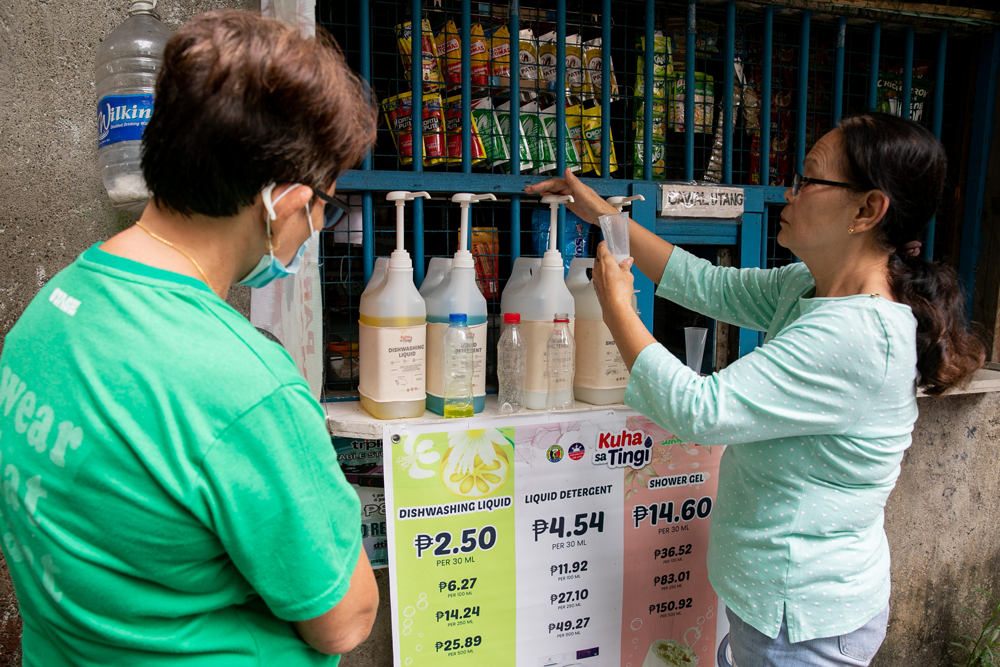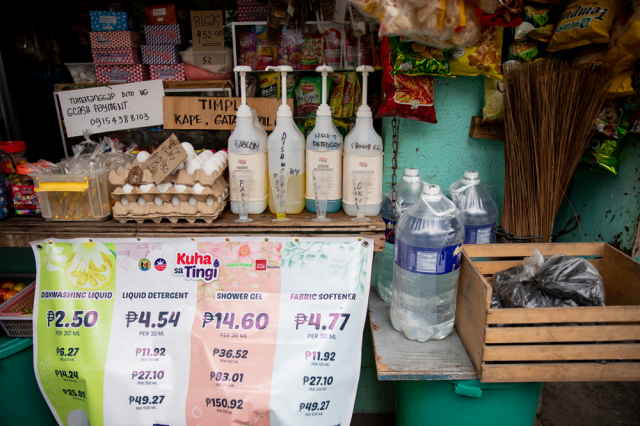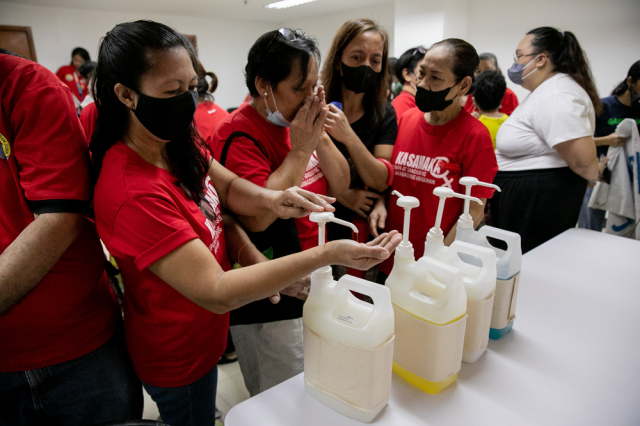In San Juan, some sari-sari stores now have refilling stations to offer daily essentials in tingi quantities

Stores offering product refills are not a new idea. In the last five years or so, a number of stores as well as brands offering product refills have cropped up in Metro Manila and other parts of the Philippines to help curb the worsening plastic pollution problem.
It is exactly the reason why Greenpeace Philippines, incubator lab Impact Hub, and the local government of San Juan City have come together for Kuha sa Tingi (KST), an initiative that enables sari-sari stores to offer product refills of various daily essentials in tingi quantities.
"KST is a project that establishes refilling stations in communities," Marian Ledesma, Zero Waste campaigner of Greenpeace Philippines and KST project lead tells GMA News Online in a Zoom interview.
"We decided to have them hosted in sari-sari stores in order to reduce sachet use, as well as plastic pollution."
According to a 2018 UN report, the Philippines is among the 5 countries producing half of the world's plastic waste, with our rivers emitting the most number of plastic into the ocean.
With microplastics already found in salt, as well as in human blood, solving the plastic problem has never been more urgent.
KST aims to do just that in two ways: It makes sachet purchases unnecessary by allowing small volume refills, and it involves the government — or at least a local government unit.
"It's really important that we have a counterpart in government because while people's personal choices will have an impact, corporate action and government efforts are more significant in terms of impact and reach. That's what makes them essential if we want to tackle plastic pollution," Ledesma continues.
KST is currently in its pilot program. It began in November with 10 sari-sari stores offering the refilling scheme across the city of San Juan.
Greenpeace laid down the groundwork before the pandemic, reaching out to various cities with highly urbanized areas to pitch the project. San Juan was the very first to agree.
"We were thinking, this project is really to rethink the small-volume retail model in sari-sari stores and community shops, so it shifts away from pre-packaged goods and sachets," Ledesma said. "It's not just about plastic waste but also reducing impacts of plastic production and plastic pollution in general."
In selecting the participating stores, Ledesma said "It was important that [the stores] have enough foot traffic for them to be viable, and at the same time, their proximity to residential areas."
Four products are currently available for refilling at a minimum quantity of 30 mL, which is equivalent to one sachet: Dishwashing liquid retails at P2.50, laundry detergent is at P4.54, fabric conditioner is at P4.77 and a 2-in-1 bodywash at P14.60.

According to Ledesma, store owners have reported the dishwashing liquid to be the pilot's best-seller. It makes sense: "That's the one people use every day, at every meal so it's really utilized."
The 2-in-1 bodywash meanwhile needs a rethinking — or at least, a review of pricing. "It is a bit higher than most. At P14.60, it's by far the most expensive of the four products," Ledesma said, adding "we have to figure out if it makes more sense just to have shampoo, or just have soap, or to tweak the product to make it cheaper."
KST sources the products from Chemlux, a local company that supplies pretty much the same products to various hotels and food chains "so we know it's good quality product and they can manage orders and work with us on pricing because pricing is an important factor."
Meanwhile, Greenpeace tapped Impact Hub, an incubator lab that does "a lot of things, mostly in innovation or creating new business models or designing projects. One of the areas of their work is Sustainability," Ledesma says, adding Impact Hub helped Nutriasia with their refilling efforts in BGC and QC.
The idea of KST is similar to most refilling stores: Customers come with their empty containers and fill it up according to however much they need. This eliminates the need for the sachet, and eliminates the subsequent plastic waste from sachets.
While it happens that customers forget to bring their containers, these sari-sari stores are near residential areas, making it easy for them to retrieve their containers from home. "Some sari-sari stores are also resourceful so they collect and clear containers from neighbors and offer to customers that don't have their own bottles," Ledesma shared. "For the most part however, the consumer already has their container."
KST will be in operation until April after which Greenpeace, Impact Hub, and San Juan will go back to the drawing room to assess, tweak, and recalibrate.
"The pilot sort of doubles as a way for us to adjust the model," Ledesma says. "Impact Hub has already expressed interest in continuing the project but we have to figure out how to make it doable for scaling."
Among the challenges they're seeing is logistics — ensuring scalable and timely delivery of products to sari-sari stores — as well as reverse logistics, or the process of returning the big containers to the suppliers to get them refilled.
There is also the challenge of figuring out the needs of each community "because every area and every community have different needs. So where we expand and replicate will also go through sort of an assessment process similar to what we did in San Juan."
And finally, brand recognition. "Understandably, may concerns yung store owners about the branding, where the products come from, if it's effective, if it's good. So we really had a thorough onboarding. We introduced the them to the supplier, gave them samples so they can see for themselves how it works. We had a barangay roadshow to engage the communities so they can also test the products."

Whatever learnings and insights Greenpeace gets from KST, they plan on sharing with local governments and legislators "to see if they can make policies that will help main stream refill and reuse. They can have this model as well as other projects like this as reference."
She adds, "If would be great if multinational FMCG companies could provide their goods for refilling — they don't necessary need to be part of KST. We will engage them when the model has been proven and tested after the pilot."
While the idea is to eliminate sachets, single-use plastic, and plastic pollution all together — including the negative environmental, health, and social impacts that come with plastic production — there is another thing KST aims to do: Restore our tingi culture back to its sustainable roots.
"Before sachets, our tingi culture, our small volume retail was characterized by sustainable practices that used native and reusable materials," Ledesma said.
"Tingi used to be about bringing your garapon or lagayan to the store and having it refilled. So that's why we wanted to use KST to reclaim that image and reimagine the idea to become zero-waste once more." — JCB/GMA Integrated News




